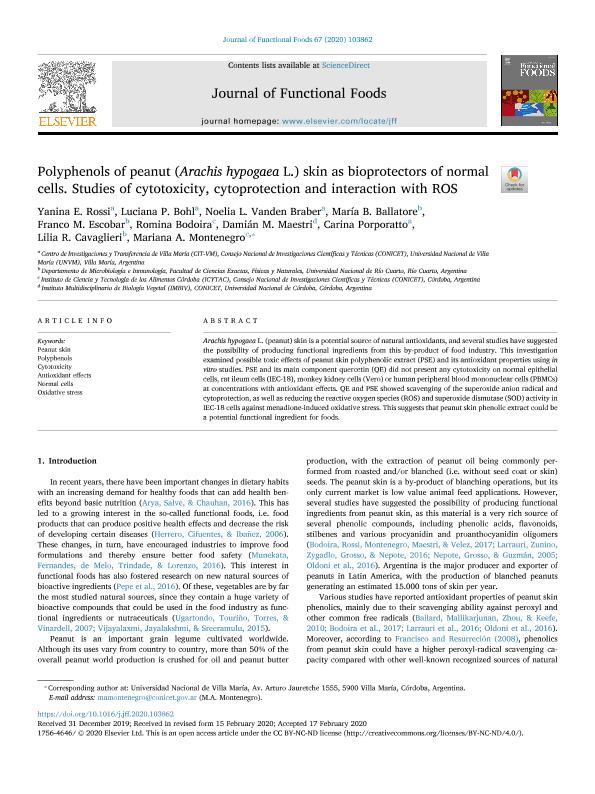Artículo
Polyphenols of peanut (Arachis hypogaea L.) skin as bioprotectors of normal cells. Studies of cytotoxicity, cytoprotection and interaction with ROS
Rossi, Yanina Estefanía ; Bohl, Luciana Paola
; Bohl, Luciana Paola ; Vanden Braber, Noelia Luciana
; Vanden Braber, Noelia Luciana ; Ballatore, María Belén
; Ballatore, María Belén ; Escobar, Franco Matias
; Escobar, Franco Matias ; Bodoira, Romina Mariana
; Bodoira, Romina Mariana ; Maestri, Damian
; Maestri, Damian ; Porporatto, Carina
; Porporatto, Carina ; Cavaglieri, Lilia Reneé
; Cavaglieri, Lilia Reneé ; Montenegro, Mariana Angélica
; Montenegro, Mariana Angélica
 ; Bohl, Luciana Paola
; Bohl, Luciana Paola ; Vanden Braber, Noelia Luciana
; Vanden Braber, Noelia Luciana ; Ballatore, María Belén
; Ballatore, María Belén ; Escobar, Franco Matias
; Escobar, Franco Matias ; Bodoira, Romina Mariana
; Bodoira, Romina Mariana ; Maestri, Damian
; Maestri, Damian ; Porporatto, Carina
; Porporatto, Carina ; Cavaglieri, Lilia Reneé
; Cavaglieri, Lilia Reneé ; Montenegro, Mariana Angélica
; Montenegro, Mariana Angélica
Fecha de publicación:
04/2020
Editorial:
Elsevier
Revista:
Journal of Functional Foods
ISSN:
1756-4646
Idioma:
Inglés
Tipo de recurso:
Artículo publicado
Clasificación temática:
Resumen
Arachis hypogaea L. (peanut) skin is a potential source of natural antioxidants, and several studies have suggested the possibility of producing functional ingredients from this by-product of food industry. This investigation examined possible toxic effects of peanut skin polyphenolic extract (PSE) and its antioxidant properties using in vitro studies. PSE and its main component quercetin (QE) did not present any cytotoxicity on normal epithelial cells, rat ileum cells (IEC-18), monkey kidney cells (Vero) or human peripheral blood mononuclear cells (PBMCs) at concentrations with antioxidant effects. QE and PSE showed scavenging of the superoxide anion radical and cytoprotection, as well as reducing the reactive oxygen species (ROS) and superoxide dismutase (SOD) activity in IEC-18 cells against menadione-induced oxidative stress. This suggests that peanut skin phenolic extract could be a potential functional ingredient for foods.
Archivos asociados
Licencia
Identificadores
Colecciones
Articulos(CCT - CORDOBA)
Articulos de CTRO.CIENTIFICO TECNOL.CONICET - CORDOBA
Articulos de CTRO.CIENTIFICO TECNOL.CONICET - CORDOBA
Articulos(ICYTAC)
Articulos de INST. DE CIENCIA Y TECNOLOGIA DE ALIMENTOS CORDOBA
Articulos de INST. DE CIENCIA Y TECNOLOGIA DE ALIMENTOS CORDOBA
Articulos(IMBIV)
Articulos de INST.MULTIDISCIPL.DE BIOLOGIA VEGETAL (P)
Articulos de INST.MULTIDISCIPL.DE BIOLOGIA VEGETAL (P)
Citación
Rossi, Yanina Estefanía; Bohl, Luciana Paola; Vanden Braber, Noelia Luciana; Ballatore, María Belén; Escobar, Franco Matias; et al.; Polyphenols of peanut (Arachis hypogaea L.) skin as bioprotectors of normal cells. Studies of cytotoxicity, cytoprotection and interaction with ROS; Elsevier; Journal of Functional Foods; 67; 4-2020; 103862-103862
Compartir
Altmétricas



